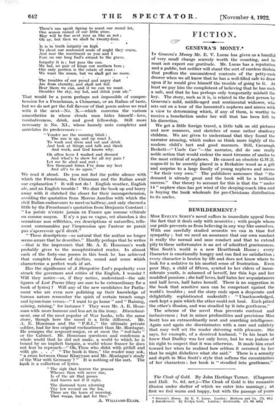FICTION.
GENEVRA'S MONEY.* IN Genevra's Money Mr. E. V. Lucas has given us a handful of very small change scarcely worth the counting, and he must not expect our gratitude. Mr. Lucas has a reputation and a public, but neither will stand the sort of careless disdain that proffers the unconsidered contents of the petty-cash drawer when we all know that he has a well-filled safe to draw upon if he would give himself the trouble of going to it. At least we pay him the complithent of' believing that he has such a safe, and that he has perhaps only temporarily mislaid the key. The story, such as it is, is related in the first person by Genevra's mild, middle-aged and sentimental widower, who sets out on a tour of the lamented's nephews and nieces with a view to determining which, if any of them, is worthy to receive a benefaction under her will that has been left to his discretion.
We get a little foreign travel, a little talk on old pictures and new manners, and sketches of some rather shadowy children. We are given to understand that they found the narrator amusing, which makes us think more highly of the modern child's tact and good manners. Still, Cavanagh Beckett—" Uncle Cav "—the narrator, did do one really noble action that would endear the most tiresome of uncles to the most critical of nephews. He caused an obsolete G.W.R. wagon-lit to be secretly placed in a Berkshire wood as a gift and surprise to a large family of young nephews and nieces " for their very own." The publishers announce that " the demand is already great and the book will be a brilliant success." Our theory to account for this is that the " under 14 " nephew class has got wind of the sleeping-coach idea and is buying the book wholesale for pre-Christmas distribution to its uncles.






































 Previous page
Previous page